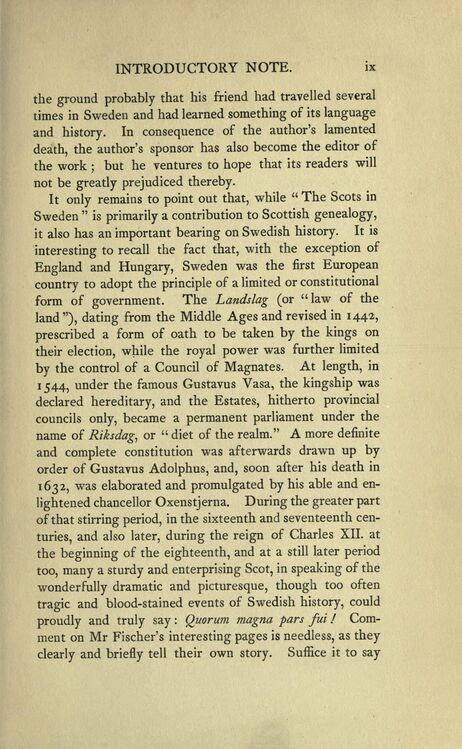
Full resolution (JPEG) - On this page / på denna sida - Sidor ...

<< prev. page << föreg. sida << >> nästa sida >> next page >>
Below is the raw OCR text
from the above scanned image.
Do you see an error? Proofread the page now!
Här nedan syns maskintolkade texten från faksimilbilden ovan.
Ser du något fel? Korrekturläs sidan nu!
This page has never been proofread. / Denna sida har aldrig korrekturlästs.
the ground probably that his friend had travelled several
times in Sweden and had learned something of its language
and history. In consequence of the author’s lamented
death, the author’s sponsor has also become the editor of
the work ; but he ventures to hope that its readers will
not be greatly prejudiced thereby.
It only remains to point out that, while “ The Scots in
Sweden ” is primarily a contribution to Scottish genealogy,
it also has an important bearing on Swedish history. It is
interesting to recall the fact that, with the exception of
England and Hungary, Sweden was the first European
country to adopt the principle of a limited or constitutional
form of government. The Landslag (or “law of the
land ”), dating from the Middle Ages and revised in 1442,
prescribed a form of oath to be taken by the kings on
their election, while the royal power was further limited
by the control of a Council of Magnates. At length, in
1544, under the famous Gustavus Vasa, the kingship was
declared hereditary, and the Estates, hitherto provincial
councils only, became a permanent parliament under the
name of Riksdag, or “ diet of the realm.” A more definite
and complete constitution was afterwards drawn up by
order of Gustavus Adolphus, and, soon after his death in
1632, was elaborated and promulgated by his able and
enlightened chancellor Oxenstjerna. During the greater part
of that stirring period, in the sixteenth and seventeenth
centuries, and also later, during the reign of Charles XII. at
the beginning of the eighteenth, and at a still later period
too, many a sturdy and enterprising Scot, in speaking of the
wonderfully dramatic and picturesque, though too often
tragic and blood-stained events of Swedish history, could
proudly and truly say: Quorum magna pars fui!
Comment on Mr Fischer’s interesting pages is needless, as they
clearly and briefly tell their own story. Suffice it to say
<< prev. page << föreg. sida << >> nästa sida >> next page >>